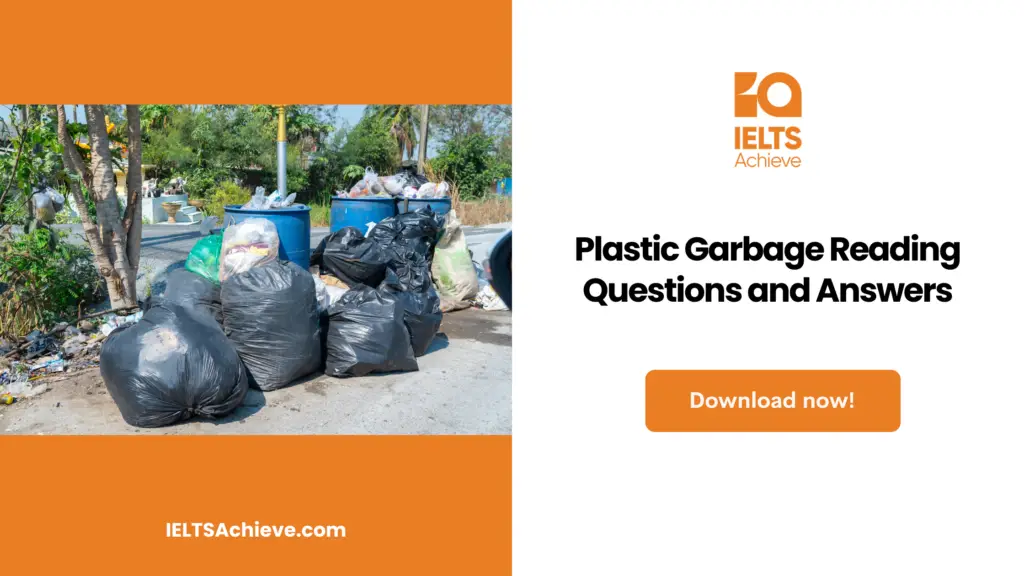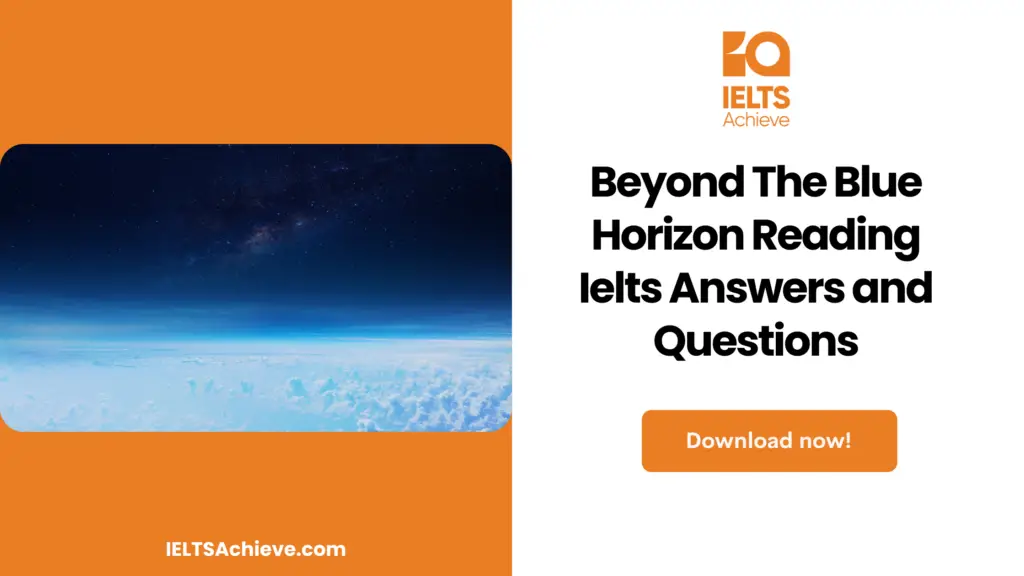The Blog post contains the following IELTS Reading Questions:
- IELTS Reading True/False/Not Given
- IELTS Reading Multiple Choice Questions
- IELTS Reading Summary Completion
Stay informed and prepared for success – Explore our comprehensive Reading Test Info page to get valuable insights, exam format details, and expert tips for mastering the IELTS Reading section.
IELTS Reading Passage – Plastic Garbage

Plastic Garbage
AEvery year over 6.4 million tons of plastic debris end up in the sea. As the standard kinds of plastic are not degradable, they drift around the oceans for decades or indeed centuries and collect in enormous gyres of plastic debris. Today plastic is everywhere on the open sea, on the seafloor and on beaches. There is not only disfigures the beauty of nature and leads to economic losses but also has alarming effects on nature, animals, and ultimately also on. The real cause of the plastic pollution of the seas is our thoughtless way of using plastics. Making use of plastic where it may not be necessary, littering, and the lack of waste management all lead to increasing amounts entering our waters. And, even where one would hardly suspect it, we contribute daily to marine pollution: by washing clothes made of synthetic fibres.
BEstimates suggest that 80% of the waste from land reaches the sea through rivers. Therefore the problem of plastic waste in the sea does not affect only countries with a marine coastline but essentially all regions where plastic is used. Plastic also becomes a problem in lakes, rivers, streams and wetlands.
CEurope’s main water divides run right across the continent. This means that waste from regions in the interior of the continent can reach the sea along the big European rivers: for instance along the Po into the Adriatic, via the Rhine into the North Sea, down the Rhone into the Mediterranean and along the Danube into the Black Sea.
DLight pieces of plastic float around on the surface and are carried by the currents for long periods across great distances. Numbers of them are washed onto the coasts. Plastics with a density greater than that of water sink to the seafloor. So far little research has been conducted into the situation on the sea or ocean floor. It seems likely that especially large collections of heavy sorts of plastic, such as PET and HDPE, have formed there, mostly off densely populated areas of coastline and near river deltas. It is feared that the concentration of plastic restricts the exchange of gas between the seafloor and the water.
E Research work carried out by Kara Lavender Law, an oceanographer at the Sea Education Association(SEA), has shown that over the last 20 years the amount of plastic measured on the surface of the Atlantic has stagnated, even though the amount entering the sea is growing continuously. She evaluated more than 7500 samples collected on research expeditions made by SEA over a period of 25 years. What happens to the surplus?
F One of Law’s theories suggests that a considerable amount of the debris is consumed by plankton-eating animals. Another theory says that sea organisms colonize the pieces of plastic which thus become heavier and sink to the bottom. Plastic is consumed on the seafloor, too: Erin Graham and Joseph Thompson proved in 2009 that sea cucumbers ingest large amounts of plastic with their food.
G The problem of marine pollution became widely known as early as the 1970s. The first legislation and initiatives for the protection of the seas date from this time. Today there are many protagonists, initiatives and legal guidelines aimed at cleaning up and protecting the seas.
H The enormous amount of material used by our society is becoming a growing dilemma for the environment. Politicians, producers and consumers are all called upon to equal extents to take the necessary measures. While politicians and producers have their guidelines and agendas, consumers are left to find their own strategies. A well-known and meaningful approach is that known as the three Rs: «Reduce, Reuse, Recycle. These strategies are especially applicable to the way we make use of plastic.
I The order in which the terms reduce, reuse and recycle are placed reflects their importance. First of all, we must reduce our use of plastic wherever this is possible. What must be bought should be used for as long as possible, and when this is no longer possible it should be sent off to be recycled. According to regional habits and the persons whom it is wished to address these three terms are augmented by a number of further suggestions. Producers and designers are urged to «rethink> and <redesign»>- this means that the products manufactured should result in less waste. At the end of the life cycle the options for those products that cannot be recycled are to: «recover) (use to provide energy) or<<dispose of» (properly).
Unlock your full potential in the IELTS Reading section – Visit our IELTS Reading Practice Question Answer page now!
Recommended Questions:
Renewable Energy IELTS Reading Question with Answer
Questions 1-7
Write TRUE, FALSE OR NOT GIVEN for the following statements in boxes 1-7 on your answer sheet.
TRUE – if the statement agrees with the information
FALSE – if the statement contradicts the given information
NOT GIVEN – if there is no information on this at all
1Mammoth gyres of plastic debris are collected as the standard category of plastic is non-degradable, they hover around the oceans for decades and centuries.
2Nowadays a large amount of land on earth is sheltered with plastic.
3Plastic wreckage barely affects nature, creatures and even health.
4Source of Marine pollution is synthetic fibres.
5Hardly 20% squander creates trouble for countries with a coastline as the throwaway gets to the sea through rivers.
6European rivers are to be blamed to take the waste from regions in the core of the continent to the sea.
7It’s due to the weight of the plastic whether it drifts or is submerged.
Enhance your skills in identifying information as True, False, or Not Given. Click here to discover expert strategies and techniques for mastering this question type in the IELTS Reading section.
Questions 8-13
Choose ONLY ONE WORD from the passage for each answer to complete the summary given below.
Write the answers in boxes 8-13 on your answer sheet.
It is terror; the 8…………………….of the plastic confines the exchange of gas between the sea floor and the water. Investigations have revealed the quantity of plastic on the surface of the Atlantic has 9…………….while the amount going into the sea is 10………………incessantly. The rising trouble for the environment is the 11……………amount of stuff used by the public. Three R’S: Reduce, Reuse, Recycle are the 12………to make use of plastic. To turn waste out of manufactured goods, producers and designers are 13……………..to juggle around with and redesign.
Boost your performance in Summary, Notes, Table, and Flowchart Completion tasks. Click here to explore our detailed guide and learn how to effectively complete summaries, notes, tables, and flowcharts in the IELTS Reading section.
Questions 14
Choose the correct letter A, B, C, OR D.
Write the correct letter in box 14 on your answer sheet.
14According to the article, which is the most excellent way to shrink plastic garbage?
ARethink, Redesign
BReduce, Reuse, Recycle
CRecover, Dispose
DRestrict, Limit, Manage
Ready to improve your performance in Multiple Choice Questions (MCQs)? Click here to access our comprehensive guide on how to tackle MCQs effectively in the IELTS Reading section.
Unlock your full potential in the IELTS Reading section – Visit our IELTS Reading Practice Question Answer page now!
Recommended Questions:
Renewable Energy IELTS Reading Question with Answer
Answers
1Answer: TRUE
2Answer: NOT GIVEN
3Answer: FALSE
4Answer: TRUE
5Answer: FALSE
6Answer: TRUE
7Answer: TRUE
8Answer: Concentration
9Answer: Stagnated
10Answer: Growing
11Answer: Enormous
12Answer: Strategies
13Answer: Urged
14Answer: B

We hope you found this post useful in helping you to study for the IELTS Test. If you have any questions please let us know in the comments below or on the Facebook page.
The best way to keep up to date with posts like this is to like us on Facebook, then follow us on Instagram and Pinterest. If you need help preparing for the IELTS Test, join the IELTS Achieve Academy and see how we can assist you to achieve your desired band score. We offer an essay correction service, mock exams and online courses.

